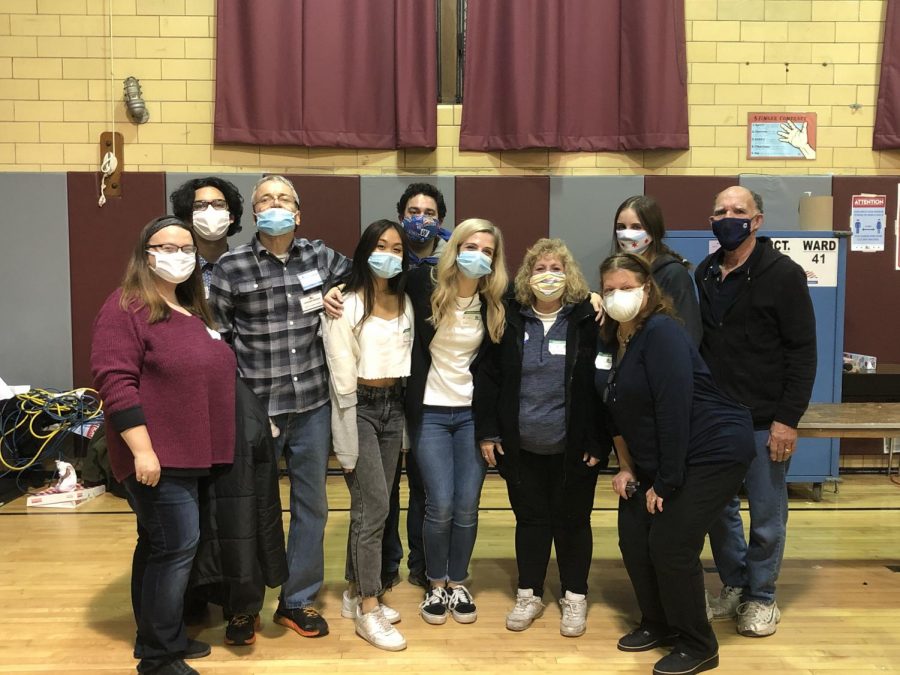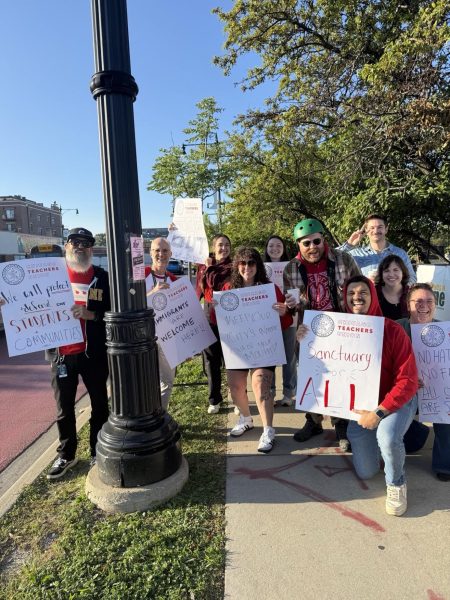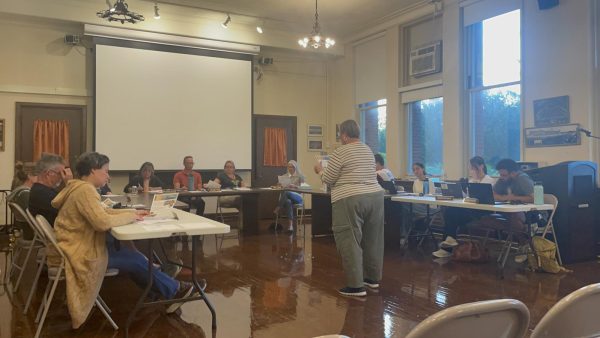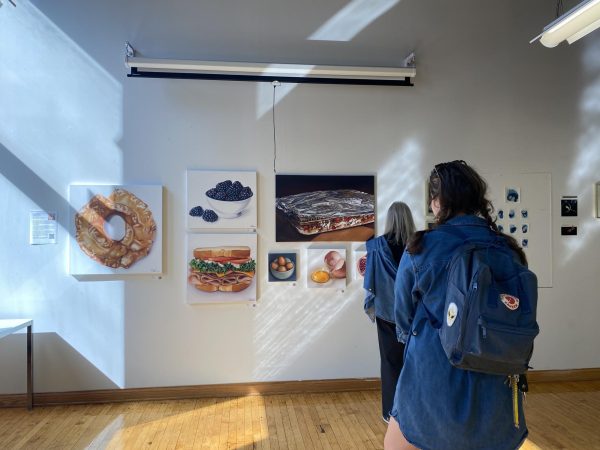A Lane Tech look into Election Day 2020
Election judges, young and old, pose after a long day of processing voters on Election Day.
To Cayleigh Kissinger, Div. 270, the controversial actions of the Trump Administration were a shocking invite into politics.
“I really did not know much about politics until after Donald Trump and his administration starting making homophobic, racist, and sexist claims and all of these decisions and jumping into these actions,” Kissinger said. “It opened my eyes, it was a smack to the face.”
Having opened her eyes to the inner workings of the political world, quarantine became a period of self-education and growth. Kissinger found herself involved in more social and political activism than ever before; she brought focus towards the Black Lives Matter movement through posting petitions, and continued to educate herself in political matters. The warm days of spring and summer passed into colder autumn months, and for most Americans, the nearing presidential election incited fear and anxiety. But despite growing worry, it would be the chance for young people like Kissinger to step up to serve for the first time, empowered by the newfound strength and influence of their voices to contribute in any way they can.
Upperclassmen at Lane aged sixteen and over have had the chance to participate in the student election judge program. The school has always had many students serve as judges, and with this year’s special circumstances, the opportunity to serve was further propelled into the spotlight. As a result, this year was no exception in student participation. APUSH teacher Julie Caracci is one of numerous teachers who have been promoting the program to her students for a number of years now.
“I am very proud of our students who stepped up to participate in this year’s election,” Caracci told the Warrior via email. “Many traditional poll workers, who are typically older and inherently more at risk from exposure to coronavirus, declined to work this year. Therefore, high school judges were more needed than ever for this particular election.”
Being two years short of the minimum age to vote, Kissinger was disappointed she couldn’t vote. But her strong desire to add to her knowledge of politics drove her to contribute in any other way she could.
“When this opportunity to be an election judge was presented to me,” Kissinger said, “I was like, well, this is great! This is exactly what I’m looking for.”
Being a student judge was a great way to learn how the election functioned at one of its most vital stages, even with the special circumstances surrounding the process, according to Kissinger. On the report of data fetched from voters on Nov. 3, Kissinger’s precinct mostly voted early by mail, keeping up with the city’s Democratic trend of voting this year. A smaller number of people arrived at the polling place to vote in-person as a direct consequence, entailing a slower day with more downtime.
In that downtime, however, she had the chance to learn more about the community in which she grew up through the people she met.
“We got to talk about politics and our political views while people weren’t there, of course, because we can’t be voicing our opinions,” Kissinger said, “but it was really cool to get a wider perspective of my community as a place, the neighborhood I live in — how the majority of people think regarding their political and social views.”
Kissinger said she would step up to serve again, albeit for a different place next time in order to gain a new perspective. Even with her fair share of moments from Election Day — whether it was sitting down to have casual conversation about politics or voting bloopers — she thinks the long day can be hard to sit through.
“I think it was a really cool experience,” she said. “But I think if you are already pretty big into politics, it’s a very long day and it can be very unproductive when no one comes in for an hour. I liked it, but it’s not for everyone.”
Student judges were able to walk out with not only a paycheck, but at the end of the day were also directly a part of the democratic process that has been the heartbeat of America since its birth two centuries ago.
Following a hectic Election Day, Caracci talked to many of her students about their experiences.
“Though there were certainly some difficulties that popped up, most students had positive reports,” Caracci said. “At the very least, I think our student judges certainly have a new understanding of elections and how much manpower is needed in order for this important feature of our democracy to work!”
For many young Americans, turning eighteen on the cusp of election season can be an exciting feeling. As with having the chance to be a student election judge, many Lane seniors also had the chance to vote. But with election week taking place in November, not every senior would be old enough to be a registered voter. Inspired by the power in her newfound right, May Hyde, Div. 184, was able to register to vote just in time for the election.
“I wanted to make a difference,” said Hyde. “People often don’t realize the power of their vote, and I understand that considering the fact that there are different opinions on how much a vote matters. I think a vote is very important.”
Hyde’s first election was marked by the consequences of COVID-19. The senior also worked as an election judge, giving her a firsthand look into the precautions — and dangers — of the polling place.
“Going into the polls, it’s nerve wracking,” Hyde said. “There are people you don’t know whether or not they’ve been socially distancing.”
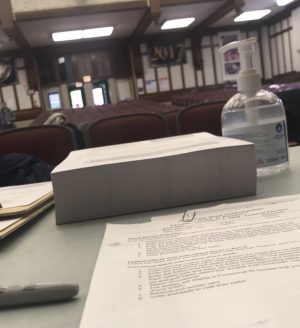
According to Hyde, however, her precinct processed its voters with ease and safety, despite any obstacles from the adjustments to the pandemic. Mail-in voting also ushered in safety for voters in her precinct, which Hyde considered a smart process despite all of its controversies.
Like Kissinger, Hyde learned a lot about her community serving in the election this year. “I didn’t know my precinct very well,” she said. “I don’t talk to a lot of people outside my house. I’m very introverted and I stay inside. I thought it was very interesting though, because I got to talk to a lot of people and meet people I never would casually walk up to and talk to.”
A monumental impact on Hyde was the power of her singular vote. For its elections, the State of Illinois legitimizes voters by address, not by ID card. This legitimization powerfully marks the significance of the right to vote, according to Hyde.
“I think that there is this right to vote that everyone doesn’t have,” she said. “So I feel like I get to vote for myself, and I have something that not everyone has, and I should be happy that I can do this this year.”
For many young people, the divisions caused by the current administration were a cold introduction to the political scene. Even if President Trump hadn’t brought upon a historic election calling for more young voices, both Hyde and Kissinger believe that all teenagers should be cognizant of all spheres of politics and educated in current issues.
“Because this election was controversial shouldn’t be the only reason why kids are interested in it,” Hyde said. “Kids should always be involved, no matter what the context is behind politics. When you do get to vote, it’s important that you know what you’re voting for and it’s unfortunate that this year was controversial; it was such a big factor.”
Hyde is new to the political scene, having always found politics a bit overwhelming. When asked about her voting experience, she was disappointed to not have known all of the names listed on her ballots.
“I live in this state, where these people determine laws while I’m living here,” she said. “You only know about one election because [of] how discussed it is in the media. You don’t know anything else.”
For Kissinger, the 2020 election awakened realizations of just how divided the country was, and the existence of an extreme variety of political opinions outside historically blue cities like Chicago and New York City. She felt like Chicagoans had been living in a bubble.
“We know we’re a lot more educated and open than some other states with people who were raised in a conservative way,” said Kissinger.
The election was historic, seeing a voter turnout that shattered decades-old records. But what was quite monumental was the new wave of younger voters stepping into the spotlight knowing the power of their voice and vote. What Kissinger and Hyde learned from their experiences had come to round them into better and more educated individuals wanting to make an impact on America’s future.
“The fact that Trump lost, it gave me so much more hope for this country,” Kissinger said. “It makes me think that people are actually opening their eyes.”
Your donations directly fund the Lane Tech student journalism program—covering essential costs like website hosting and technology not supported by our school or district. Your generosity empowers our student reporters to investigate, write, and publish impactful stories that matter to our school community.
This website is more than a publishing platform—it's an archive, a research tool, and a source of truth. Every dollar helps us preserve and grow this resource so future students can learn from and build on the work being done today.
Thank you for supporting the next generation of journalists at Lane Tech College Prep!
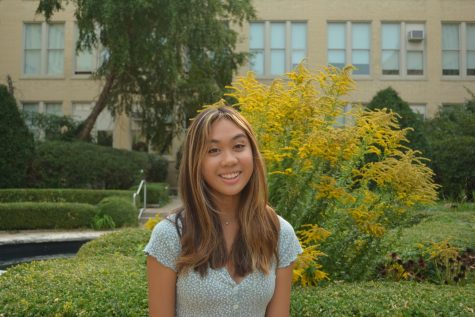
Megan is a senior and in her second year as a Champion editor. Whether it's playing on the field or reporting on the sidelines, sports never fail to be...

